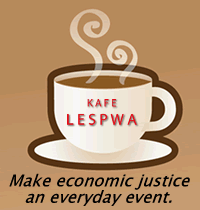 Kiva.org is one of the best ideas I have come across in a long time.
Kiva.org is one of the best ideas I have come across in a long time.A monumental problem facing would-be entrepreneurs in impoverished nations is the lack of access to funds and others resources. Whether you want to be a goat herder in Kazakhstan or open a family restaurant in America, one universal fact is true: Businesses need investment and capital. However, folks from villages in Mongolia, Uganda, El Salvador and the Philippines have difficulty securing loans.
A downside of capitalism is that the best way to get a traditional loan is to have the ability to pay it back! Banks try to avoid risk by lending to people with a good credit history and other factors. This becomes a barrier for folks who are trying to enter into the system. The poor stay poor while the rich have the opportunity to get richer. It can be frustrating and disappointing to appeal to larger banks and nations to reverse trends and make funds available to these people.
Something needs to be done to level the playing field. Microlending is one of the leading ways to do this. "Microlending" is a general term for any lending done to folks who generally would not have access to traditional loans due to credit history, location or other circumstances. Many are simply living in a "pre-banking" society. Microlenders often use infrastructures and modes of traditional cultures to build networks of accountability, communication and support.
The genius of Kiva.com is that it makes use of the magic of the internet to take the case directly to the world's citizens. For example, you, as a citizen of the USA, can make a loan directly to a citizen of Azerbaijan. There are few intermediaries and gatekeepers in the way.
What are these loans for?
- A farmer in Mongolia to purchase 2 animals to start a cattle breeding business.
- A courier in Uganda to buy a motorcycle.
- A hairstylist in Bolivia for the purchase of equipment to expand her business
Field partners of Kiva identify people who are good candidates for microlending. You can view their profiles and loan requests on the Kiva website. You, as a lender, can pick which person you want to lend to. As the person pays the loan back, you are paid back as well. You would then have the option to withdraw your money, apply it to another loan, or donate it to Kiva to cover operating expenses.
Just for fun, you can link your contribution to any number of groups for some healthy competition. Groups are organized around national identify, religion or other interests, such "Australians," "Kiva Christians" or "GLBT," just to name a few. It should be pointed out that the group "Atheists, Agnostics, Skeptics, Freethinkers, Secular Humanists and the Non-Religious" lead the way by far. Their combined achievement is nearly double the next largest group, "Kiva Christians."
As with anything, be sure to do your homework. Microlending has been abused in some cases, where it can resemble loansharking if not handled appropriately. The poor are vulnerable and are often exploited the easiest by the wolf who comes in sheep's clothing. Also, microlending is not the only way to alleviate poverty, but it is a good first step. Nations with entrenched, systemic poverty and political injustice may not be brought out of that by the success of a few entrepreneurs. However, to those few entrepreneurs, it may make all the difference in the world.





No comments:
Post a Comment